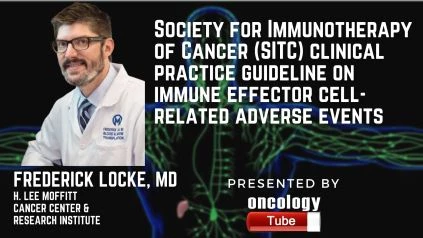Frederick L. Locke, MD from H. Lee Moffitt Cancer Center and Research Institute speaks about the Society for Immunotherapy of Cancer (SITC) clinical practice guideline on immune effector cell-related adverse events.
Link to Article:
https://jitc.bmj.com/content/8/2/e001511#ref-88
Summary
In a large number of patients with hematological tumors, immune effector cell (IEC) therapies have long-term remissions. Although these novel immunotherapies have increased results for children and adults in a variety of diseases, their toxicity profiles, such as cytokine release syndrome (CRS) and immune effector cell-associated neurotoxicity syndrome (ICANS), vary significantly from that of traditional cancer therapies. At the time of writing, the US Food and Drug Administration (FDA) had approved tisagenlecleucel, axicabtagene ciloleucel, and brexucabtagene autoleucel, all of which are IEC therapies based on genetically modified T cells engineered to express chimeric antigen receptors (CARs), and more products are expected to gain FDA approval and enter clinical trials soon. As IEC therapies, especially CAR T cell therapies, become more widely used in clinical trials, simple, consistent toxicity management guidelines are needed, prompting the Society for Immunotherapy of Cancer (SITC) to convene an expert panel to establish a clinical practice guideline. The panel addressed general toxicity identification and control in the sense of IEC care, including baseline laboratory criteria for tracking, timing to onset, and pharmacological treatments, with the goal of forming evidence- and consensus-based guidelines to aid medical professionals in decision-making and optimize patient outcomes.

